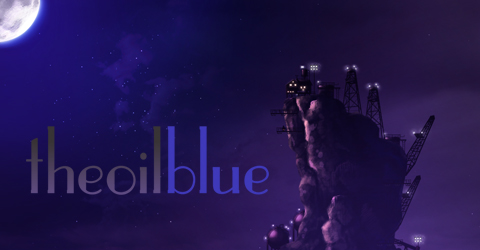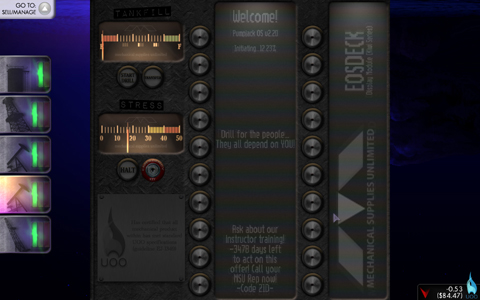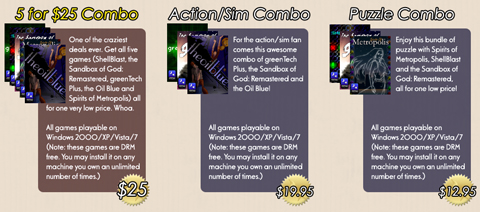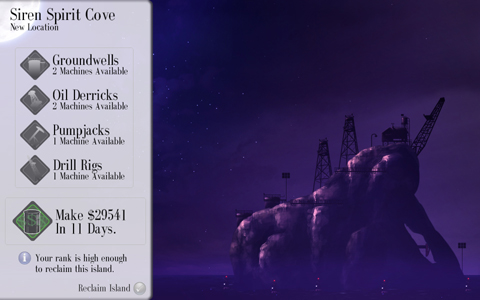Trending
Opinion: How will Project 2025 impact game developers?
The Heritage Foundation's manifesto for the possible next administration could do great harm to many, including large portions of the game development community.

Featured Blog | This community-written post highlights the best of what the game industry has to offer. Read more like it on the Game Developer Blogs or learn how to Submit Your Own Blog Post
A look at the six month sales total of a PC indie game, the Oil Blue.

About six months ago, I released my first major indie PC game, the Oil Blue, which went on to get some good positive feedback amid the BP oil spill controversy. A month afterwards I shared my sales experiences on Gamasutra, and today I’d like to follow up on that post with a final look at my six months in selling the Oil Blue on my own and with other distributors.
It’s easy to look at these sales I present in this article and scoff at them, given that Minecraft probably makes in five minutes what it took me nearly a year to make, but I maintain transparency on my game sales with the hope that it'll help somebody out there. So, let's get to discussin'!

Where We Left Off
First off, you should probably check out my previous post on the first month sales of the Oil Blue, which gives more detail into making the game, my challenges I faced up front, and the overall goals and plans I had to push the game in the future.
Among the unknowns at that time were: would I be able to get onto the Steam platform, who had not yet contacted me at that time? What about other review sites, or even a publisher/distributor for the game? And how would sales be affected once my summer promotion (buy the Oil Blue, get greenTech Plus, another indie PC game of mine, for free) ended on August 31st? I would soon know the answers to all of these questions in the months to come.
I should also note that while my games go under the label “Vertigo Games” it’s really just myself and two others that I contract out work to, as well as having a part time job. So I’m not depending on these sales to make payroll/make a living, thank goodness, though I’d certainly like to some day!
Sales So Far
After the first month, I reported in the previous blog entry that sales had reached $1,645, not counting outside distributors such as GamersGate. Using the same standards I can now say that after six months sales stand at $2,766, an increase of about $1,100 over five more months (again not counting GamersGate and other distributors, who have provided a nice amount of income similar to the sales on my site.) It just goes to show how absolutely important your first month of sales are to your game, before it gets locked into a slow trickle of sales for the remainder of it's life (or until the next big promotion/highlight/sale).
Looking at the numbers at face value don’t tell the whole story however, as I’ll break down just how exactly I got those sales in a period of little to no coverage/advertising.

The Promotion Factor
The Oil Blue launched at $14.95, with an added “summer promotion” on my site: buy the Oil Blue, and receive greenTech Plus, a game that was not available for purchase at the time, absolutely free. The promotion was set to end on August 31st.
greenTech Plus was a game I had created based off of a simple freeware game for a YoYo Games competition I did a few years back. It was created for the simple purpose of porting to other platforms...to test the waters a bit. greenTech Plus is fundamentally a simple game, which is why I made it- simply to give to two starting developers for porting and selling on new platforms other than the PC. Once the Oil Blue was wrapping up development, I realized I could make greenTech Plus as a PC game with little effort and use it to push the Oil Blue via a promotional giveaway of sorts.
My concern with the promotion was simply if it was a crutch for all the sales I had received, and how the Oil Blue would do without bundling it with another game. Should I keep the promotion going and extend the offer? Would I need to decrease the price of the Oil Blue once the promotion was over? Would people be angry that they missed this promotion a few weeks afterwards and not buy the game as a result, or wait for another promotion? It was quite honestly terrifying to think of all the possibilities.
Thankfully the game managed to sell OK sans promotion. The Oil Blue sold 24 copies during August (the last month of the promotion) and went on to sell 17 copies in September, creating about $530 worth of sales during that timeframe (note that these copies do not include bundle sales, which I’ll get to in a bit). The later months would not be quite as active, as the game fell out of notice with all the new holiday games and sales that were coming up.
Holiday Hibernation
There are two things an indie dev should do during the last few months of the year: either ramp up and throw as much effort as you possibly can towards a new game release, or get the hell out of the way for major game and even indie game promotions and sales.
I have previously released two games during the December timeframe (called The Sandbox of God: Remastered and Spirits of Metropolis) with disastrous results. You simply can’t get in touch with any sites about a preview or promoting the game due to the holiday break, and most gamers are too busy with other larger high profile releases. So going into the holidays with the Oil Blue in 2010, I knew I had two choices: either create a massive firesale and bring attention to the game for a few days, or stay low and regroup in January. I chose to just lay low, and I’m pretty happy with my decision as there were a large number of sales for indie games in December, not to mention the Steam sale and Humble Indie Bundle #2. There would simply be no way I could compete with some of the offers in those sales given my limited audience.
But that didn’t mean I could experiment a bit.

Combos and Bundles
While the Oil Blue was doing fairly well, there were some that simply weren’t moving at all. These were the hardcore puzzle games I had created some years ago, and never really attempted to push them for sales anymore as I had learned a lot since their development: they’re solid games, but their time to sell was pretty much up.
But what if I offered some new bundles once the summer promotion I had for the Oil Blue was over? Something not quite on the level of a Humble Indie Bundle, because again, there would be no way to compete with something like that given my limited audience and funds, but maybe offer a good bundle of the games I have made at a solid price point.
Using the five games I had now amassed for selling over the years (The Oil Blue, the Sandbox of God: Remastered, greenTech Plus, Spirits of Metropolis and Shellblast), I created three unique bundles, or Combos as I called them. One was called the Puzzle Combo (Shell, Spirits and SOG:R) for $12.95, a savings of about six dollars. Next was the Action/Sim Combo (SOG:R, Oil Blue and greenTech) for $19.95, a savings of about three dollars. Finally, there was the “5 for 25” pack of all five games for $25, a savings of about thirteen dollars, easily the best deal.
Obviously if ShellBlast/Spirits was selling like hotcakes, the combo wouldn’t make any sense for me (both games hardly sold anything in 2010). But I was ready to give those games away if it meant bringing in more sales, which it did nicely: by the end of 2010 I sold 31 bundles, making an extra $485 on top of the normal single sales of the Oil Blue and the other games. Not bad for something that cost zero dollars to make happen. The 5 for 25 bundle was the best seller, with the Action/Sim combo hardly selling anything at all.
Steam Responds!
My last blog entry had me wondering what, if any, intentions Steam had towards selling my game on their service, given that they had downloaded the game twice using the login I provided but sending no feedback. But about a month after making that blog post, I finally received feedback from Steam.

Sadly, that was all the information provided. Part of me wanted to know, why wasn’t it a good fit? Could I change anything, or was it something technical? I thanked them and let them know how disappointed I was, but that I would be in contact for my next game. I felt that if there really was something technical about the Oil Blue that I could fix, they would have told me...no, it was simply that they didn’t like the content of the game for whatever reason. I regret not pressing the issue further and asking for further details, but at the same time I don’t ever want to come across as angry or annoying, sabotaging my future submission chances. Given that it took three months to get back to me, I didn’t want to damage the only form of direct contact I had with Steam and go through the submission process again. What a weird position to be in.
I’m not naive enough to think that a Steam distribution deal would equal an easy pile of cash. What I do know is that (a) I have a limited audience, (b) Steam has a massive audience, and (c) the demo conversion rate for the Oil Blue is quite strong, and does well on distribution sites like GamersGate. It’s a shame I won’t get that opportunity with Steam, but there’s not much else I can do.
On Discounts and Promotions
I’ve mentioned sales/discounts and bundles quite a bit, and have had a number of people tell me that $10 would be their sweet spot to buy the game. I’ve been resistant to a short sale so far, for reasons including timing and advertising.
During the June-Sept. months, the game was freshly released, and I didn’t want to create any discounts for it simply because it was selling on its own word of mouth/coverage. Oct-Dec. were the months where I decided to put the game on ice, so to speak, in an effort to lay low during the extremely busy time of game releases and discounts. Which brings us to today and asking myself, what should I do?
As someone who has very little funds, I can’t afford to advertise hardly at all. Promotional sales have the ability to drive in traffic, and if I’m going to do that, then I need to have a new game on display or a preview of it so that people will remember Vertigo Games. In that way I’ll be able to make a sale on the Oil Blue while at the same time promoting the newest game in the works. The problem with that is I’m still months away from revealing my newest game.
There’s always a tendency to slash prices on something that moves slower than it did a few months ago, but the last thing I want to do is dilute the value of the game. Sales might be fantastic for the duration of the promotion, but once the original price goes back on, it’s hard to say if it’ll ever recoup it’s sales frequency again...a dangerous position to be in if I don’t have any more games to fall back on aside from the Oil Blue, the bestselling game I’ve made so far. And given how well my other games have performed and the low prices they have, well, I really don’t have any other games to fall back on until the next new release.

Lessons Learned
There are many things I’m coming away with from the release and sales of the Oil Blue. One was the excellent article on Gamasutra highlighting the need to hype up games months, not weeks, before release. The Oil Blue didn’t have much time to be noticed- a strong preview from IndieGames and a release just weeks later dissolved any kind of hype buildup I could possibly have. Another was the way I approached portals and sites for review requests and distribution inquiries...I blew some of my earlier chances by promoting the game to them through pictures and video instead of a playable build. More lessons came from the technical side of making the game, and some of the issues affecting the Oil Blue- mainly the BP oil spill- was simply dumb, frustrating luck.
Originally my plan was to make a commercial follow up to a restaurant simulation game I made years ago, and then go right into the Oil Blue 2. After reading a good number of reviews, oddly enough thanking the skies that it wasn’t “another restaurant game,” I’ve decided to go a new route and create another original title based around the justice system of the United States. I need to define Vertigo Games more as a brand before I can benefit on sequels and games that have a tremendous amount of competition (the mentioned restaurant genre), and what better way to do that then creating something as unique as Oil Blue but completely different...something that hasn’t been done before, not quite like this. It’s a project I’m immensely excited about.
I’m also happy to report that the years of funding my games via a credit card are over, as I’ve paid off the accumulated eight thousand dollars in credit card debt as of today. True, most of that was through my new part time job as a barista, but it’s something I’m really happy about anyways. The limited funds that come from games sales are no longer plugging up holes, but rather funding my future games instead of relying on credit. It's a great feeling to have.
Till Next Time
I’d like to thank Gamasutra and Indie Games, and the Vertigo Games community for all of their support. I’d also like to thank NeoGaf and the two best people I’ve ever worked with, Sara Gross and Jonathan Geer. Here’s to a new year of success for all of us!
----
You can find out more about the Oil Blue and download the demo here.
Read more about:
Featured BlogsYou May Also Like